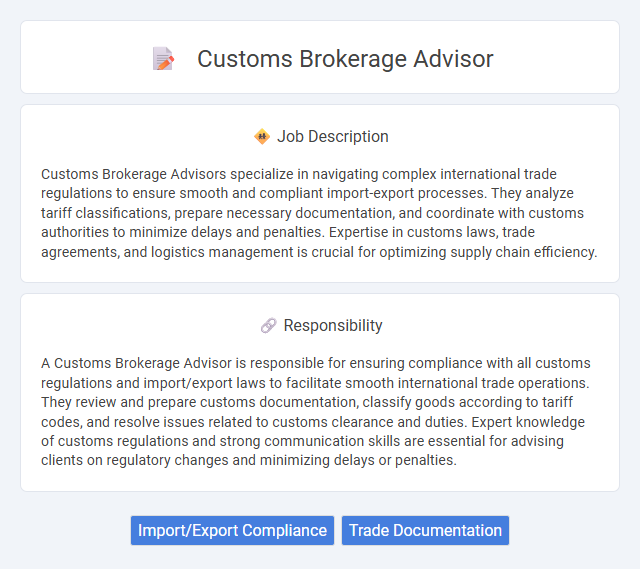
Customs Brokerage Advisors specialize in navigating complex international trade regulations to ensure smooth and compliant import-export processes. They analyze tariff classifications, prepare necessary documentation, and coordinate with customs authorities to minimize delays and penalties. Expertise in customs laws, trade agreements, and logistics management is crucial for optimizing supply chain efficiency.
Individuals with strong attention to detail and problem-solving skills are likely suited for a Customs Brokerage Advisor role, as it requires navigating complex regulations and ensuring compliance. Those comfortable working under pressure and managing multiple tasks simultaneously may have a higher probability of success in this job. Conversely, people who struggle with deadlines or lack interest in legal and trade documents might find this position challenging.
Qualification
A Customs Brokerage Advisor must have a thorough understanding of international trade regulations, tariff classifications, and customs compliance requirements. Proficiency in using customs software systems and knowledge of import/export documentation are essential for accurate customs clearance and advising clients effectively. Strong analytical skills, attention to detail, and experience working with government agencies ensure adherence to legal standards and minimize delays or penalties.
Responsibility
A Customs Brokerage Advisor is responsible for ensuring compliance with all customs regulations and import/export laws to facilitate smooth international trade operations. They review and prepare customs documentation, classify goods according to tariff codes, and resolve issues related to customs clearance and duties. Expert knowledge of customs regulations and strong communication skills are essential for advising clients on regulatory changes and minimizing delays or penalties.
Benefit
A Customs Brokerage Advisor likely helps businesses navigate complex import and export regulations, reducing the risk of costly delays and penalties. There is a strong possibility their expertise improves supply chain efficiency by ensuring accurate documentation and compliance with customs laws. This role probably offers significant benefits such as saving time, minimizing financial risks, and facilitating smoother international trade operations.
Challenge
Customs Brokerage Advisor roles are likely to involve navigating complex regulatory environments where rules frequently change, posing a constant challenge in compliance management. The probability of encountering unpredictable delays or discrepancies in customs documentation increases the need for meticulous attention to detail and problem-solving skills. Adapting to evolving trade policies and maintaining accurate communication with clients and customs officials may require ongoing learning and strategic decision-making.
Career Advancement
A Customs Brokerage Advisor plays a crucial role in facilitating smooth international trade by ensuring compliance with customs regulations and tariffs. Mastery in navigating complex import/export laws and building expertise in trade documentation positions professionals for advancement to senior advisory roles or managerial positions within logistics and supply chain departments. Continuous skill development in global trade compliance and strong client relationship management significantly enhances career growth opportunities in the customs brokerage industry.
Key Terms
Import/Export Compliance
Customs Brokerage Advisors specialize in ensuring strict adherence to import/export regulations, helping businesses navigate complex trade compliance requirements. Their expertise includes classification of goods, valuation, and documentation to prevent costly delays and penalties. Proficiency in international trade laws and customs procedures supports seamless cross-border transactions and optimized supply chain efficiency.
Trade Documentation
Customs Brokerage Advisors specialize in managing trade documentation to ensure smooth import and export processes, including accurate preparation and verification of invoices, bills of lading, and certificates of origin. They ensure compliance with international trade regulations and customs laws to prevent delays and penalties. Their expertise facilitates efficient clearance of goods through customs, optimizing supply chain operations and reducing costs.
 kuljobs.com
kuljobs.com